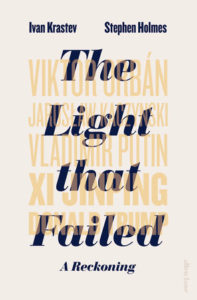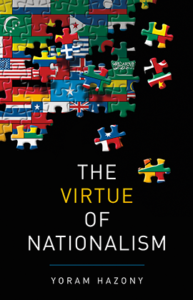The “politics of imitation” is a phrase that recurs innumerable times in The Light That Failed: Why the West Is Losing the Fight for Democracy by
Certainly, any examination of the trajectory of post-communist Eastern Europe and Russia must take note of the fact that aspirations to copy—i.e., to imitate—the success of Western liberal democracies have, in too many places, been dashed. But was this a consequence of the weight of history, the backwardness and gross distortions of economic, social, and political life caused by decades under communist rule, or is it the consequence, as Krastev [above, addressing a National Endowment for Democracy forum] and Holmes would have it, of “resentment at liberalism’s canonical status” and the absence of choice? he asks in
- The first thing to observe in evaluating the authors’ claims is the most obvious: Krastev and Holmes are propounding a thesis that is both an abstraction and based upon a psychological dynamic. Demonstrating its truth or falsity is inherently problematic.
 And the second thing to note is that, like the very analyses which they reject as “superficial,” Krastev and Holmes at numerous junctures in their book point to developments like the economic collapse of 2008, the quagmire of the second Gulf War, and the refugee crisis set off by the Syrian civil war to explain the course of events. It is not altogether clear that, for all the emphasis they place on the politics of mimicry, they are saying something that “completely transforms our understanding of the crisis of liberalism,” the immodest promise offered on the book’s dust jacket.
And the second thing to note is that, like the very analyses which they reject as “superficial,” Krastev and Holmes at numerous junctures in their book point to developments like the economic collapse of 2008, the quagmire of the second Gulf War, and the refugee crisis set off by the Syrian civil war to explain the course of events. It is not altogether clear that, for all the emphasis they place on the politics of mimicry, they are saying something that “completely transforms our understanding of the crisis of liberalism,” the immodest promise offered on the book’s dust jacket.- Third, is it really true that liberal hubris and the “absence of alternatives” to the liberal path “best explains the anti-Western ethos dominating post-communist societies today”? Implicit in this point is the assumption that in Eastern Europe and Russia there was some sort of third way, some untried alternative to market economics and the institutions of freedom, that would have yielded a more salubrious outcome.
The defining doctrines of liberal democracy are government by consent of the governed, equal justice under the law, and the separation of church and state, notes Joseph Loconte, an associate professor of history at the King’s College in New York City and the author of God, Locke, and Liberalism: The Struggle for Religious Freedom in the West.
 These are the political principles that have helped the West to defeat two of its most intractable problems—political tyranny and religious authoritarianism. It is precisely these ideas that are under assault in much of the rest of the world, he writes for the National Interest:
These are the political principles that have helped the West to defeat two of its most intractable problems—political tyranny and religious authoritarianism. It is precisely these ideas that are under assault in much of the rest of the world, he writes for the National Interest:
Nevertheless, while many on the political left ignore Locke’s influence, a growing number of conservatives have rejected it as a “dead end” toward radical individualism and social breakdown. Yoram Hazony, the author of The Virtue of Nationalism, argues that “there is nothing in the liberal system that requires you, or even encourages you, to also adopt a commitment to God, the Bible, family, or nation.”
Nonsense. These voices would cut us off from a vital source of moral and political insight, gained from bitter experience, Loconte suggests.







